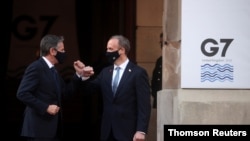Foreign ministers from the Group of Seven, representing the world's wealthiest democracies, and invited guests turned their attention to issues of global interest, including coronavirus vaccines, climate change and education for girls, on Wednesday as they concluded three days of talks in London.
U.S. Secretary of State Antony Blinken and South African Foreign Minister Naledi Pandor "underscored the need to expand global COVID-19 vaccine production and to cooperate on climate ambition,” during their meeting on the sidelines of the G-7 gathering.
Officials from Australia, India, South Africa, South Korea, and Brunei joined the G-7 Foreign and Development Ministers’ meeting as guests in London this week.
The foreign ministers’ gathering had a COVID-19 scare when the attending Indian delegation chose to self-isolate following positive coronavirus cases.
“We have no reason to believe any of our delegation is at risk,” said U.S. State Department spokesperson Ned Price.
Price added “the U.S. delegation was advised, including by the U.K.'s public health professionals, that our stringent masking, social distancing, and daily testing protocols would permit us to continue with our G-7 activities as planned.”
North Korea was high on the agenda in Blinken’s Wednesday meeting with Japanese Foreign Minister Motegi Toshimitsu and South Korean Foreign Minister Chung Eui-yong, where they reconfirmed the trilateral solidarity on shared concerns about North Korea’s nuclear and ballistic missile programs.
With Britain hosting the ministerial talks, Blinken met with British Prime Minister Boris Johnson, whose office highlighted the importance of global access to COVID-19 vaccines.
“The Prime Minister and Secretary Blinken agreed that the global roll out of vaccines will be key to defeating the coronavirus pandemic. They underlined the importance of G-7 work in this area, including efforts to increase international manufacturing capability,” a Downing Street spokesman said.
Tuesday’s G-7 meetings included a focus on China.
A senior U.S. State Department official told reporters there was broad agreement among the ministers, “both the fact that we all want China to be an integral member of the international order, but to do that, it has to play by the rules of that international order.”
The official cited concern about China’s human rights record and its “threatening and aggressive behavior in the South China Sea and other areas around its border.”
The G-7 ministerial talks are laying the foundation for a summit of leaders from those countries in June, also in Britain.
After the G-7 meetings, Blinken is scheduled to travel to Ukraine to meet with President Volodymyr Zelenskiy and other senior government officials.
State Department spokesman Ned Price said in a statement that Blinken will “reaffirm unwavering U.S. support for Ukraine’s sovereignty and territorial integrity in the face of Russia’s ongoing aggression.”




